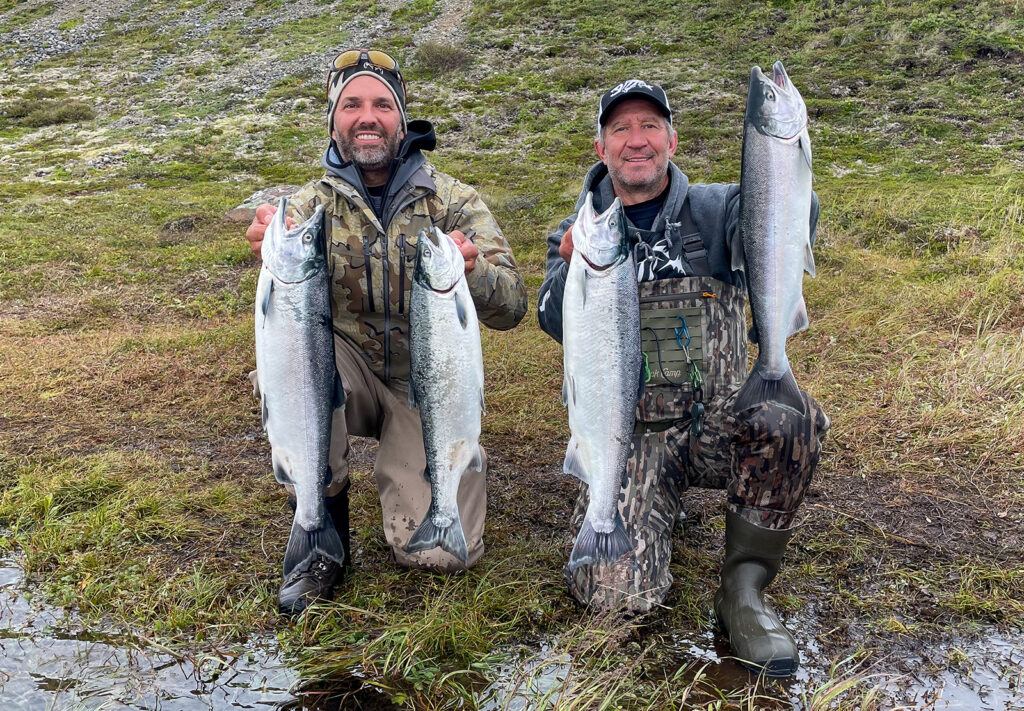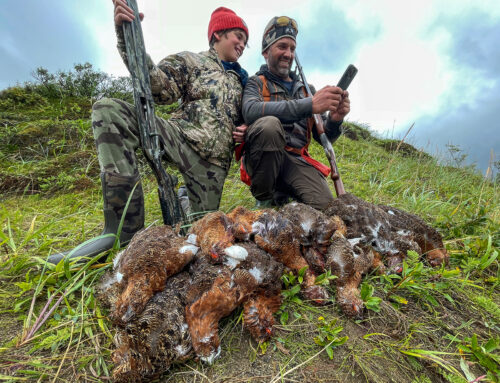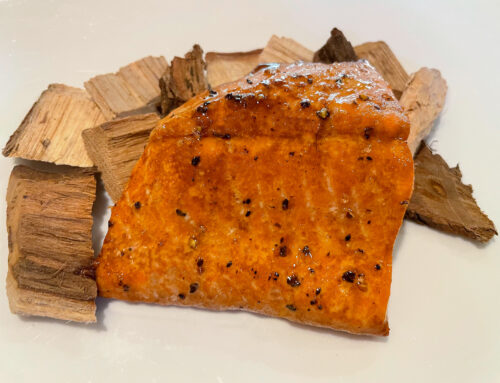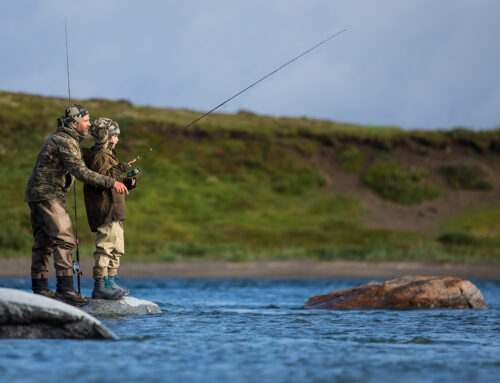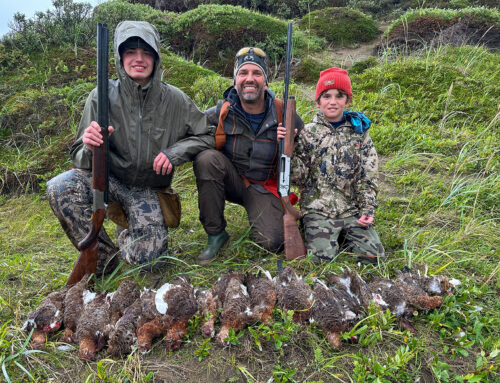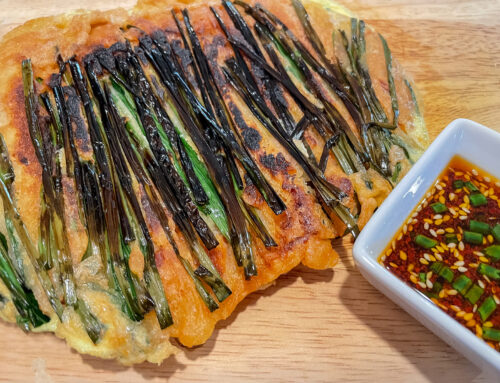“You know what, that’s fishing, and sometimes having to work at it is just what’s needed,” shared Donald Trump Jr. when I apologized for how slow the fishing was. Don, his two sons Donnie (14), Spencer (10) and I, along with others fished hard for a week with Becharof Lodge on the Egegik River. Fortunately, Don has been to Alaska many times, as well as many other parts of the world hunting and fishing. He knows nothing is ever a guarantee, not even catching coho on one of the best rivers in all of Alaska. Days before our fishing trip he hunted Dall sheep in Alaska and didn’t see a ram. He gets it.
“Donnie has been to Alaska with me before,” continues Don Jr. “He’s caught coho on every cast and we had a good time, but this was Spencer’s first trip to Alaska and sometimes it’s good for kids to have to work at things.”
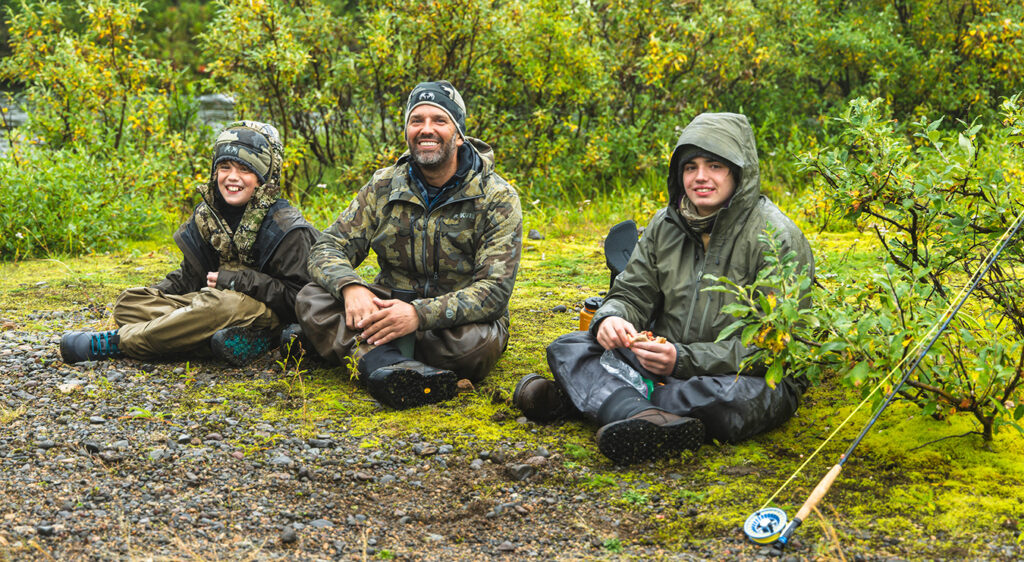
I’m an outdoor writer. I’m not a journalist. I don’t like calling people to interview them for stories. I like being afield with people, observing. I watch, draw conclusions and share. There’s a fine line between sharing and judging.
During my week with the Trumps, I watched a lot. I’ve hunted with Don before. We have an unspoken rule to never talk politics. I never interview him. We fish, hunt, share stories and enjoy being removed from the public. You don’t need to interview someone to learn about them.
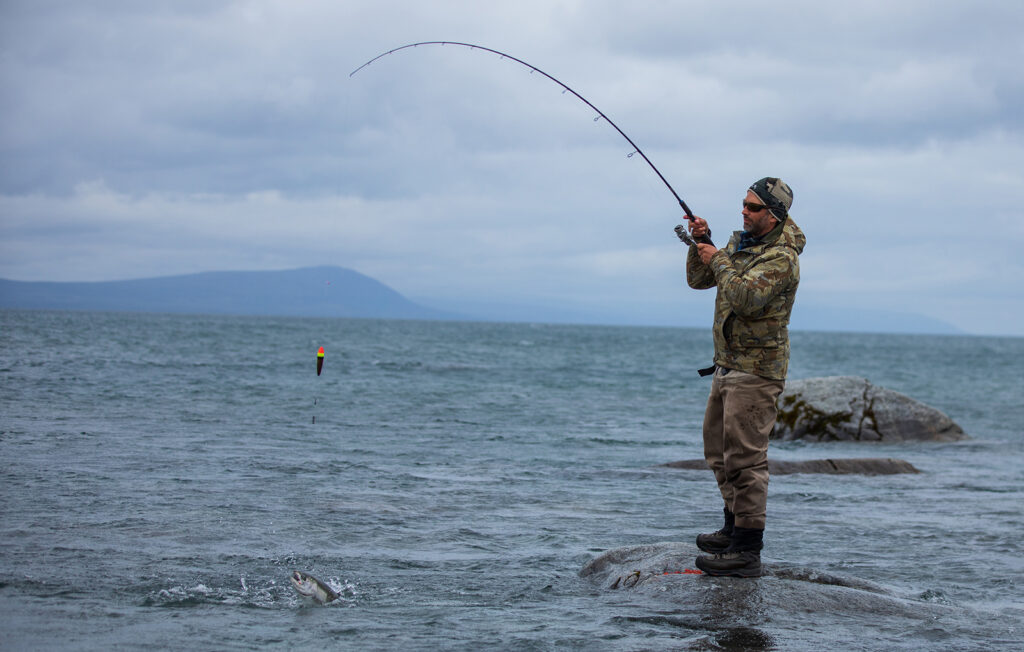
Don Jr. is one of the most well-rounded outdoorsmen I’ve been with. There aren’t many people I’ve met whom I’d feel comfortable having to survive in remote Alaska with should there be a plane crash, sunken boat, or bear attack. I’d hunt and fish with Don anytime, anywhere because he’s confident, knowledgeable, anticipates situations, and works hard. He’s always positive, always considering what can be done to make situations better. And above all, he’s patient.
Watching Don and his two sons took me back to when my two boys were young. Whether we were fishing in Alaska or hunting in Africa, we always enjoyed our time together in the outdoors. But making each trip a success hinges on being a dad, teacher and motivator all at once. You want to push them to succeed, but push too hard and it can turn them off. You want them to meet people, but not always are those people kind. And you want them to have fun, but sometimes pushing through challenges are the most influential moments.
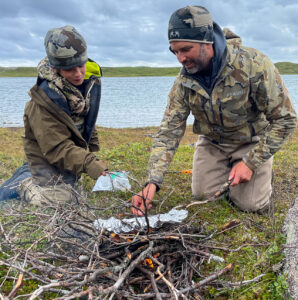
When fishing with your kids, you also want to teach them techniques and enhance their ability to catch fish. This is what Don did every single day. It didn’t take long to realize the fishing was going to be slow, and instantly Don made the most of it. “Spencer, tomorrow we’re going to drift eggs under a bobber and the first salmon you catch we’re going to cook up for a shore lunch,” Don shared with his sons at dinner one night.
For the next several minutes Don, Donnie and Spencer were engaged in planning how they’d cook the fish. Then we gathered the ingredients, planned for cooking in the rain, and this included how to build a fire on the tundra with wet, limited wood.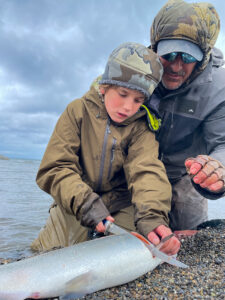
The following morning Spencer caught a coho right away. He wanted to cook it right then. Instead, we kept fishing. Don educated his boys on how, even in Alaska, the morning can be the best time to catch fish. He assured them they’d cook the fish as soon as the bite slowed down. Eleven coho later, things slowed down and it quit pouring rain, only drizzled.
Don cleared away some soggy moss on the tundra, exposing dirt to place sticks on to start a fire. Both boys headed to a rocky spot on a south-facing knoll and gathered armloads of dead, miniature willows. Don encouraged them to start gathering high, where the wind would have dried out the dead fuel and sandy soil provided ample drainage. The tiny sticks burned nice and hot.
Don taught Spencer how to clean and fillet the coho so they could cook it. The coho fillet was placed in aluminum foil. Salt, pepper and butter were added and the package set on the coals. Rather then get back to fishing, we sat around the fire and watched the coho cook. It was a slow process and time well spent. We told stories and laughed a lot.
It was one of the highlights of the trip for me. Going to such effort would have been an inconvenience for many, but not Don. He knew the fishing was slow and in an effort to take the focus off that, seized the opportunity to teach his boys how to build a fire and cook their catch in one of the wettest habitats in North America.
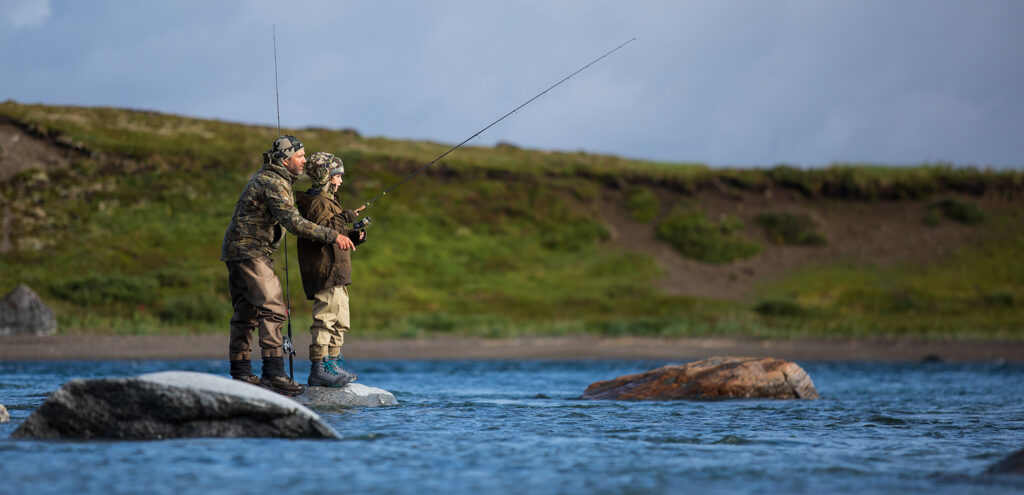
When I was a kid I remember hiking to the McKenzie River near my home in Oregon, catching trout and cooking them to eat, by myself. I thought they were the best tasting fish I’d ever had. The Trump boys said the same thing about the salmon they’d just cooked. We ate the whole thing. They loved the entire process. Spencer was so intrigued with the fish cleaning he hung with the guides the following day and learned multiple ways to clean and fillet salmon. He handled the big blade with ease.
One day we planned on going on a flyout fishing trip to a remote stream. Mark Korpi of Becharof Lodge on the Egegik River, was in communication with the bushplane pilot in King Salmon. All morning we battled fog. One minute it was clear at Becharof Lodge, and at the same time it was foggy in King Salmon so the pilot couldn’t leave. Then it’d be clear enough to fly in King Salmon but too foggy to land at the lodge. After five hours of waiting, we called it off, for there wouldn’t be enough time to get to the stream and fish it. The entire time the Trumps were troopers, never down, never discouraged and understanding that bush pilots always have the final say when it comes to traveling in remote Alaska. We all had a fun morning hanging out at the lodge, eating way too much of Goni’s incredible food and telling stories. Then we went fishing for coho that afternoon and did well. Everyone was happy.
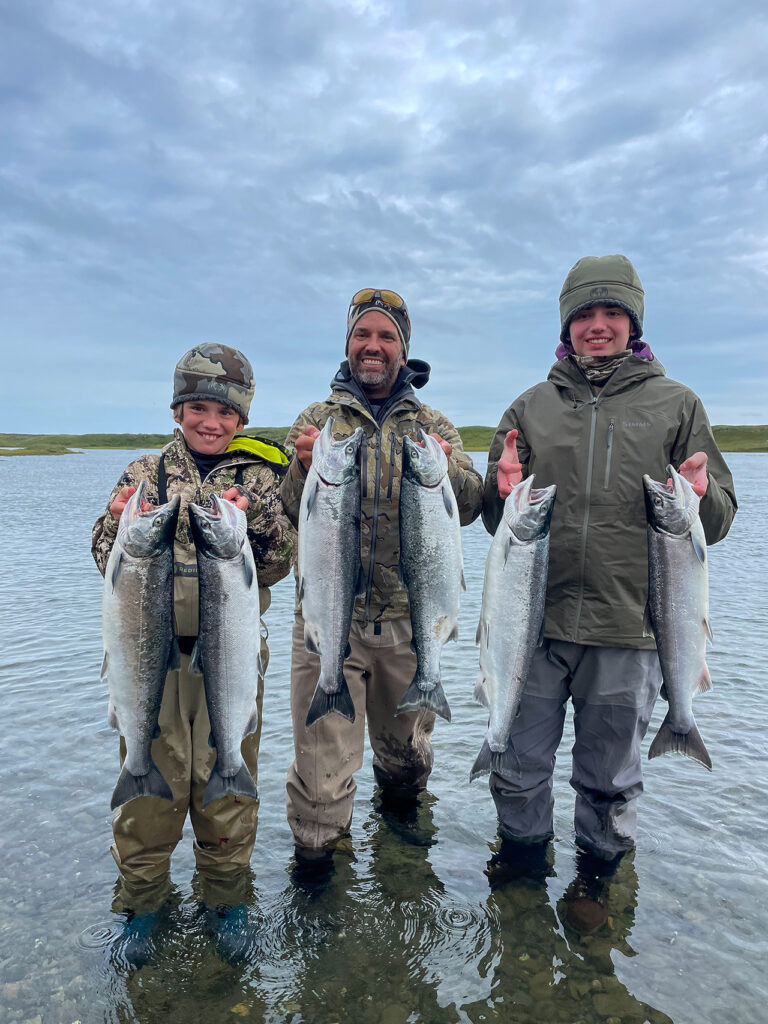
The following day we hiked to Becharof Lake, Alaska’s second largest lake. Fishing Becharof Lake is a favorite experience of many anglers when staying at Becharof Lodge on the Egegik River. This is the headwaters of the Egegik River and the fishing can be spectacular at the lake. On the first cast I caught a fat coho. Donnie quickly followed with a big buck. Spencer waded amid big boulders in chest-deep water, hopped up on a big, flat rock and caught four coho by noon. He dubbed it Spencer’s Rock. He fished it another day, catching coho by casting spinners and floating BnR Tackle Soft Beads with cured eggs beneath them. Between bites we combed the shoreline and ate wild berries on the tundra. The boys were never bored, never once complained. If they got tired and wanted to take a nap, Don let them. He knew if he pushed too hard, things could quickly turn.
On our third day of trying we finally made it on a flyout trip. Due to high water levels the pilot dropped us on a lake well above the river we wanted to fish. It was 8:00 a.m. The pilot would be back at 5:00 p.m. to pick us up and head back to the Becharof Lodge.
It poured rain the entire day. The two mile hike across the wet tundra, through thick alders and up and down steep hills was far from easy, but the Trump boys handled it like champs. They didn’t complain one time. “That was one of the most enjoyable flyouts I’ve ever been a part of,” smiled David Stumpf, head guide for Becharof Lodge who just wrapped up his 15th season. We caught a lot of Arctic grayling and char. It was some of the best grayling fishing I’ve experienced in over 30 years of fishing throughout Alaska.
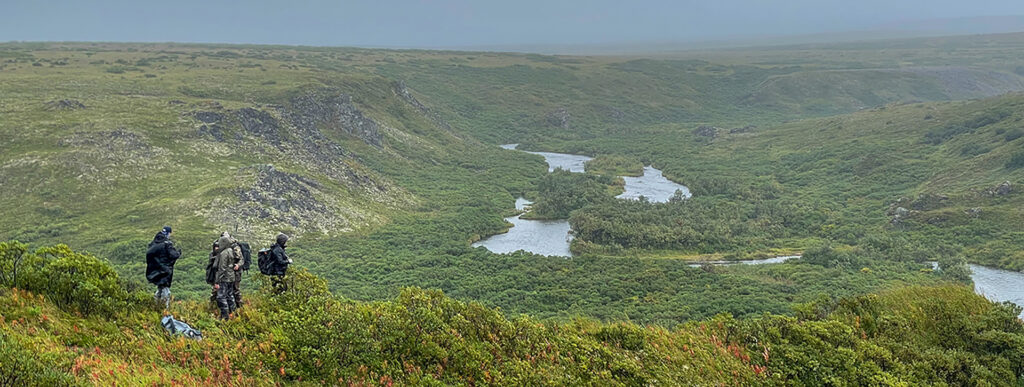
The stream was high and far from easy to wade. In fact, it was difficult to wade in many places and it was a technical stream to fish. Don was on a mission, dissecting every riffle and back eddy with precision. Toward the end of the day we came to a big, deep hole. Fish were sparse, then we saw one rise beneath some overhanging alders. Then another one rose. Don drifted a bead through the slot with no luck. Then he asked David for a dry fly. Over the next hour Don laid nearly every cast exactly where it needed to be, and caught whopper grayling, lots of them, including one over 20-inches. I’ve fly fished in a lot of places with some exceptional casters, and Don tossed a fly as good as anyone I’d ever seen. It was simply fun to watch.
As we hiked out of the river, back up to the lake to meet the floatplane, the cloud layer dropped and fog began to build. It was a long hike, far from easy, and we were all sweating and tired by the time we got there. Don and I were thinking the same thing, that the visibility was so poor, there was a chance we’d have to spend the night out there. David had a little tent that would have fit two, maybe three people. I think Donnie and Spencer were pumped with the prospects of possibly camping out. There was no fear or panic, just rational thinking that helped turn a potentially frightful situation into something exciting. But as darkness closed in, the bush pilot made it in, barely.
The next morning we hiked from Becharof Lodge in search of willow ptarmigan. Spencer was in heaven. He likes fishing but loves bird hunting. He shot his first ptarmigan and nearly got his limit. He wanted to keep going, keep pushing over the crest of each rolling hill on the vast tundra. He loved everything about this experience, and he worked hard. We hiked over five miles that day and it was one of the highlights of the week, for all of us. The next day we covered over eight miles and shot more birds.
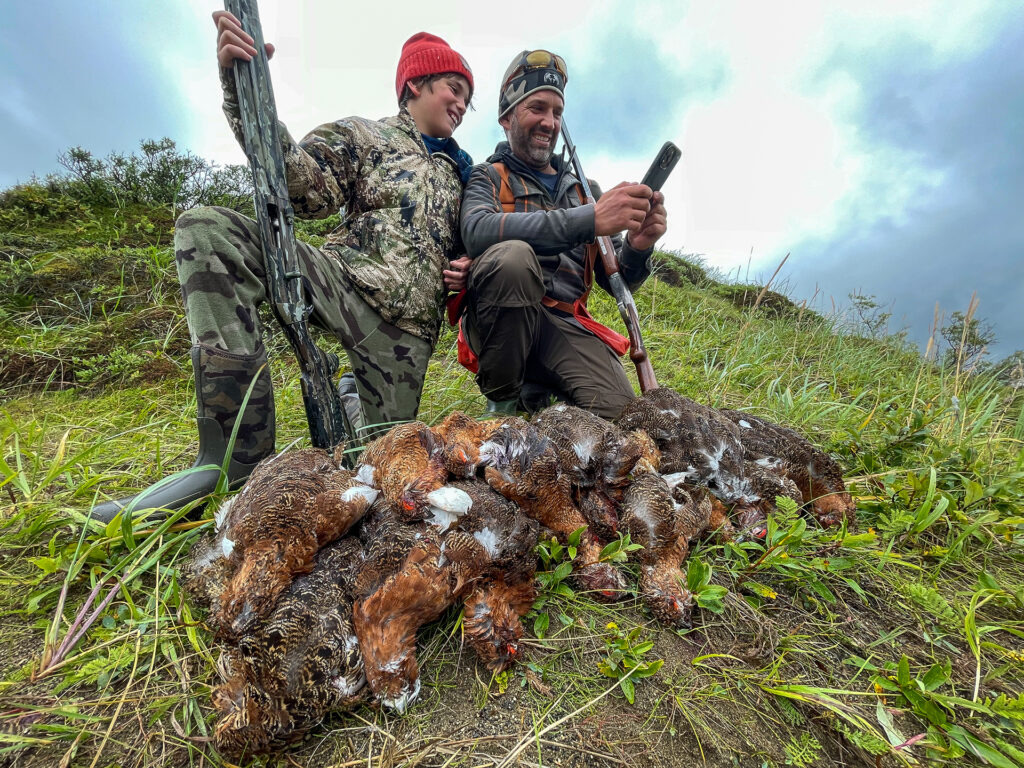
The more time you spend in the outdoors, the more you realize a successful trip isn’t always measured in numbers. Sometimes the most valued times are a result of making something out of nothing, getting to know people, and finding the positives. I’ve fished with a lot of folks over the decades and my time with the Trumps was most memorable, not because of their name, but because of the kind of people they are. Positive, supportive, fun, and always willing to take on a challenge. Don recognized that slow fishing was the perfect opportunity to teach his sons about overcoming challenges, something they’ll face throughout life, and making the most of who you’re with at any give time.
Story & Photos by Scott Haugen
